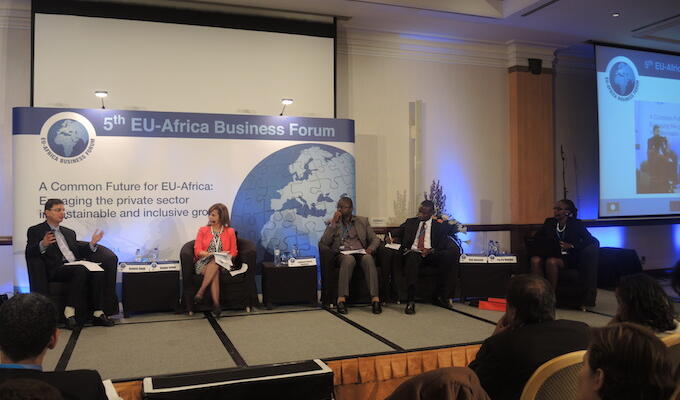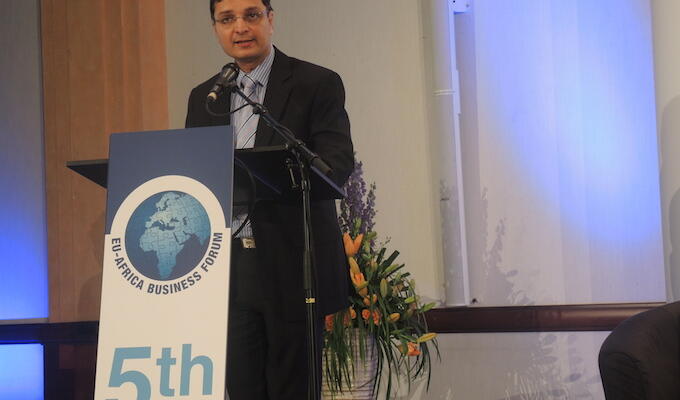

Building resilient African economies through trade
Establishing an enabling environment that allows small and medium-sized enterprises (SMEs) to trade is an important step towards building more resilient economies in Africa. This point was made by the Acting Deputy Executive Director of the International Trade Centre (ITC) Ashish Shah at the EU-Africa Business Forum in Brussels on 1 April 2014. Speaking at the Roundtable on African SME Success Stories at the Forum, Mr Shah said a vibrant private sector in Africa can capitalize on globalization opportunities through the integration of SMEs in value chains. He said this is particularly important as SMEs represent more than 80 per cent of private enterprises in Africa and serve as the largest source of employment for women, youth and vulnerable communities.
‘Africa needs a new breed of entrepreneurs who can innovate into new sectors such as the high value-added agro-industry, information and communication technologies, business process outsourcing, development of renewable energies and tourism,’ said Mr Shah. ‘Africa’s private sector can make a significant contribution to the development of the continent and needs the support of governments, donors and international organizations such as ITC to enable it to unleash its potential.’
Mr Shah said the regional economic communities in Africa have made substantial progress in integrating their markets by establishing free trade areas and harmonized external tariffs but these measures have not as yet translated into significant increases in regional or international trade flows, competitiveness or employment. Under ITC’s Programme for Building African Capacity for Trade which is funded by the Canadian government, support has been provided to enhance Africa’s regional integration agenda. In a partnership with the Common Market for Eastern and Southern Africa (COMESA), the Economic Community of Central African States (ECCAS) and the Economic Community of West African States (ECOWAS), ITC has worked to promote the export competitiveness, market linkages and export revenues of African SMEs.
Mr Shah said more engagement with the private sector in new growth segments rather than a continued focus on traditional exports of commodities will boost African trade. He said the economic landscape will be transformed by the conclusion of the new Economic Partnership Agreements with the EU and further efforts towards deeper regional integration.
‘A broader set of actions is required to reduce the barriers to international trade, which includes access to finance, entrepreneurship and skills development, innovation and technology, compliance with private standards and addressing non-tariff measures. There is also a need to ensure that trade agreements, including those concluded by the European Union with developing countries, particularly the least developed countries, be accompanied by a strong set of measures to improve the competitiveness of their SMEs. Development assistance being targeted at strengthening the private sector in developing countries should revolve around strengthening trade support institutions, fostering trade competitiveness, building platforms for private-public dialogues, fostering vocational training and capacity-building, and creating market linkages through business-to-business platforms,’ said Mr Shah.
He emphasized that closer attention should be paid to helping women-owned SMEs to internationalize. Despite their growing economic force with eight to ten million women-owned SMEs in developing countries representing close to 40 per cent of total SMEs, he said women entrepreneurs face specific challenges such as limited access to finance, export training, market information and other barriers in the business environment.
‘SMEs driven by women entrepreneurs across Africa are generating employment and adding value to exports in innovative ways. Helping to foster women entrepreneurship through capacity-building, the setting-up of women-owned SMEs and linking women-owned SMEs to regional and global markets needs to remain central to discussions on SME internationalization,’ said Mr Shah.
He underlined the critical role of investment, including through non-bank supply chain financing, angel investors and venture capitalists, for SME development. He said substantial barriers have to be overcome to facilitate impact investment which could reach $400 billion to $1 trillion by 2020.



